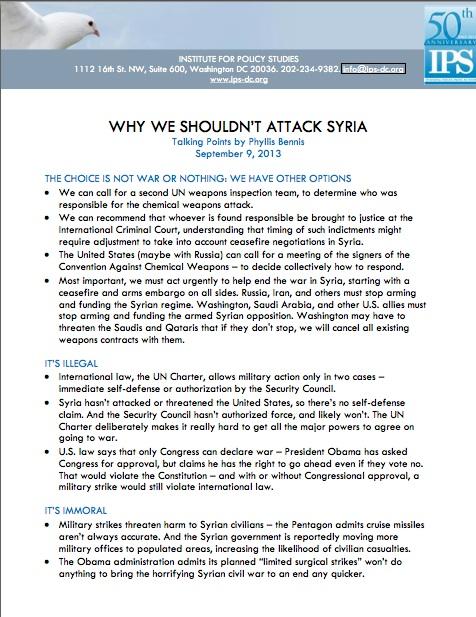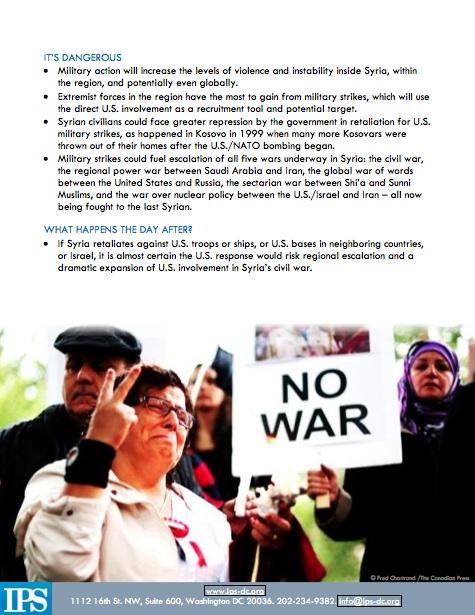CLICK HERE TO DOWNLOAD – PRINT FORMAT
THE CHOICE IS NOT WAR OR NOTHING: WE HAVE OTHER OPTIONS
- We can call for a second UN weapons inspection team, to determine who was responsible for the chemical weapons attack.
- We can recommend that whoever is found responsible be brought to justice at the International Criminal Court, understanding that timing of such indictments might require adjustment to take into account ceasefire negotiations in Syria.
- The United States (maybe with Russia) can call for a meeting of the signers of the Convention Against Chemical Weapons – to decide collectively how to respond.
- Most important, we must act urgently to help end the war in Syria, starting with a ceasefire and arms embargo on all sides. Russia, Iran, and others must stop arming and funding the Syrian regime. Washington, Saudi Arabia, and other U.S. allies must stop arming and funding the armed Syrian opposition. Washington may have to threaten the Saudis and Qataris that if they don’t stop, we will cancel all existing weapons contracts with them.
IT’S ILLEGAL
- International law, the UN Charter, allows military action only in two cases – immediate self-defense or authorization by the Security Council.
- Syria hasn’t attacked or threatened the United States, so there’s no self-defense claim. And the Security Council hasn’t authorized force, and likely won’t. The UN Charter deliberately makes it really hard to get all the major powers to agree on going to war.
- U.S. law says that only Congress can declare war – President Obama has asked Congress for approval, but claims he has the right to go ahead even if they vote no. That would violate the Constitution – and with or without Congressional approval, a military strike would still violate international law.
IT’S IMMORAL
- Military strikes threaten harm to Syrian civilians – the Pentagon admits cruise missiles aren’t always accurate. And the Syrian government is reportedly moving more military offices to populated areas, increasing the likelihood of civilian casualties.
- The Obama administration admits its planned “limited surgical strikes” won’t do anything to bring the horrifying Syrian civil war to an end any quicker.
IT’S DANGEROUS
- Military action will increase the levels of violence and instability inside Syria, within the region, and potentially even globally.
- Extremist forces in the region have the most to gain from military strikes, which will use the direct U.S. involvement as a recruitment tool and potential target.
- Syrian civilians could face greater repression by the government in retaliation for U.S. military strikes, as happened in Kosovo in 1999 when many more Kosovars were thrown out of their homes after the U.S./NATO bombing began.
- Military strikes could fuel escalation of all five wars underway in Syria: the civil war, the regional power war between Saudi Arabia and Iran, the global war of words between the United States and Russia, the sectarian war between Shi’a and Sunni Muslims, and the war over nuclear policy between the U.S./Israel and Iran – all now being fought to the last Syrian.
WHAT HAPPENS THE DAY AFTER?
- If Syria retaliates against U.S. troops or ships, or U.S. bases in neighboring countries, or Israel, it is almost certain the U.S. response would risk regional escalation and a dramatic expansion of U.S. involvement in Syria’s civil war.
CLICK HERE TO DOWNLOAD – PRINT FORMAT

